Could a podcast be right for your newspaper?
Podcasts are everywhere. The audio storytelling platform has its roots in the 1980s, but emerged as a stand-alone medium starting in 2004 with the rise of digital audio devices.
Although several Arkansas newspapers, including the Arkansas DemocratGazette, the Log Cabin Democrat in Conway, the Hot Springs Sentinel Record and the Helena World have launched podcasts, newspapers on the whole have been slow to adopt them as a way to reach audiences. However, news organizations such as City Cast are having success in offering audio news and e-newsletters in select communities nationwide.

Not only are podcasts a successful vehicle for reaching younger, more diverse audiences, the podcast advertising
Arkansas Press Freedom Gala tickets on sale now
The first Arkansas Press Freedom Gala will be held Thursday, Oct. 20 at the Statehouse Convention Center in Little Rock.
Governor Asa Hutchinson will receive the 2020 Headliner of the Year Award and Hunter Yurachek, vice chancellor and director of athletics at University of Arkansas, will receive the 2021 Headliner of the Year Award.
The Distinguished Service Award will be presented to Craig Renaud and the late Brent Renaud, documentary filmmakers best known for their character-driven, cinema verite documentaries like “Dope Sick Love,” “Last Chance High,” “Off to War” and “Meth Storm.” Brent Renaud
was the first American journalist killed in Ukraine in 2022, while documenting the refugee crisis.
Golden 50 Service Awards will be presented to John Brummett, longtime Arkansas columnist, and Walter E. Hussman, Jr., Chairman of WEHCO Media Inc. and the publisher of the
The Gala begins at 6 p.m. with a cocktail reception and the dinner and program begin at 7 p.m.
Tickets are $200 each or $1500 for a table of eight. Sponsorships are also available. More information can be found starting on page 8 of this edition of Arkansas Publisher Weekly.
All proceeds from the Gala will benefit the Arkansas Newspaper Foundation, a 501(c)(3) non-profit organization and its mission of education and support for Arkansas newspapers.
To purchase tickets visit https://www. arkansaspress.org/event/FreedomGala
Could a podcast be right for your newspaper?

market is one of the few media markets to see continual growth. According to the Interactive Advertising Bureau’s annual report, podcast revenue increased 72% to $1.4 billion in 2021, and is projected to exceed $2 billion in 2022 and to almost triple to $4 billion by 2024.
“Adding a podcast could be—should be—something every newspaper should consider,” Karen Steward, owner of the Little Rock-based podcast production company Power of Pod. “And newspapers have most of the tools to do it.”
Steward started her career in journalism on public radio, working for more than fifteen years at KUAR 89, the NPR affiliate in Little Rock.
“Journalism is really all about strong storytelling,” Steward said. “Those kinds of skills really translate well into podcasting. In many ways, it was public radio that first started turning audio content into compelling podcasts. At our local station we also quickly realized the importance of making our local shows into podcasts. We saw success with the podcasts and they
became one of our priorities in terms of our digital offerings.”
Steward has a quick step-by-step process for any newspaper interested in adding a podcast to their repertoire.
Step 1: Record
Using voice recorders for day-today reporting is standard practice for journalists. The recordings are important to keep around for a while for many reasons, most notably as a record in case there are questions about the story.
Those recordings could be gold in other ways, Steward said. The audio from interviews can be used for additional content on your newspaper’s website to bolster transparency in reporting, or behind-the-scenes added value for readers. Interviews can also be used as soundbites in a news podcast.
Getting started building audio content is pretty straightforward. Steward recommends reporters simply read the printed news story into their recorder, and if reporters get more comfortable with
her steps, begin adding soundbites from recorded interviews.
For audio capture, Steward uses a Zoom Voice Recorder—a standard tool for podcasters and journalists. However, she said the free Voice Memo app on a smartphone works great to get started.
For recording phone interviews, she uses the TapeACall app that allows for incoming, outgoing and multi-line recording, along with an unlimited transcription service for $59.99/year. If you have a Zoom recorder or similar device, you can also connect your phone to it and record conversations that way.
Steward said there are advanced services such as Backtracks which offers text-totalk automation, but starting off simple by reading and recording stories and using interview audio is the way to go.
Step 2: Edit
Steward uses Adobe’s free version of its
THROWBACK THURSDAY
On Monday, Sept. 17, 2001, The Baxter Bulletin celebrated its 100th Anniversary with a special edition highlighting each 25-year period across four sections.
The 100th Anniversary Edition featured dozens of stories and even more photos cataloging the deep history of the area.
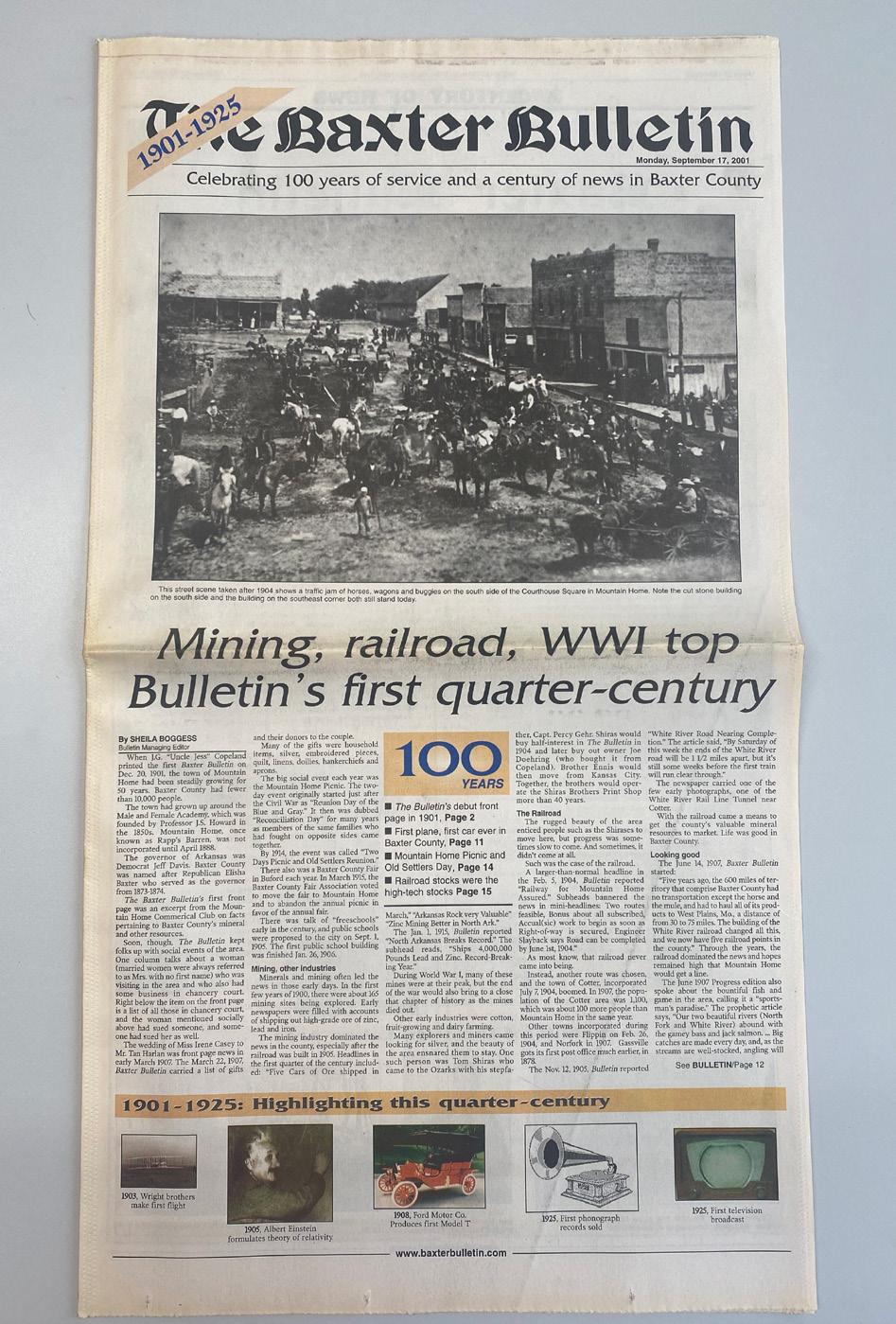
In her piece “Bulletin founder a first-rate newspaper man,” historian Chyrl Ripple wrote, “In the first issue of The Bulletin, [J.G. Copeland] stated: ‘It is the duty of every patriotic citizen to inform himself as best he can, lay aside prejudice, and vote as his conscience dictates.’”
The Mountain Home newspaper continues to inform readers 121 years later.
Could a podcast be right for your newspaper?
primary audio editing software Audition called Audacity. “I haven’t needed to upgrade yet,” she said.”
In the beginning stages of the podcast journey, reporters will most likely be using the editing software to trim the ends of a recording, clean up long pauses or multiple takes, splice two recordings together or adjust the volume. But as the podcast evolves, editing will be important for adding soundbites, natural sound, music and advertising. The most important thing, Steward said, is to go at your own pace.
Step 3: Find a hosting company
When the reporter has recorded and edited the podcast, they will need to upload it somewhere. That’s where the host comes in. Steward recommends Buzzsprout, Podbean and Acast, particularly for their dynamic ad insertion technology.
“Hosts are really about helping podcasters make money off of the hard work they’re doing,” Steward said. “Once you pick your hosting company, you are going to start uploading your files to your host and your host is going to give you what’s called an RSS feed. That’s the magic web address
Podcast hosting services range in price, but Steward said typical pricing plans range from $15 to $25 a month.
Step 4: Create accounts with podcast sites
The newspaper will need to establish accounts only once with the major streaming services, and these services are free. Apple Podcast, Google Podcast and iHeartRadio are examples of typical podcast streaming services. Once an account is created, the reporter will copy and paste the RSS feed generated by the Host. After that, every audio file uploaded to the host will go directly to the services that have the RSS feed.
Step 5: Market
“Marketing is a huge thing,” Steward said. “The saying ‘if you build it they will come’ is absolutely not true in this case. Social media marketing is very important, not only for a podcast but to reach a younger audience for the local newspaper. To remain relevant and in front of an audience, promote the podcast wherever you can.”
Steward said swaps are also very effective.
So how does a newspaper make money off of a podcast?
“The podcast advertising market is really big right now,” Steward said. “I think a local newsroom would get sponsors and advertisers locally. It’s the same as the traditional model except the spot would be an audio spot rather than an image in a newspaper or a banner ad on a website.

“If your podcast becomes successful enough, some hosting companies will facilitate advertising. Dynamic audio insertion allows you to highlight certain parts in your program that would be appropriate for an ad, and the host does all the work of dropping it in,” she said.
“There’s a big discussion about whether podcasts can help save local news,” Steward said. “And I think if anything technological or platform-related is going to help local news, it’s going to be podcasts. Honestly, I do, because that’s where audiences are going and that’s what they demand. Podcasts are also a wonderful value-add for people who are already subscribed. You can give them the latest technology and they’re going to stay with you. So yeah, I think podcasting is very important.”
APA launches public notice campaign based on study results
In a market study commissioned by APA and executed by Nashville-based research firm Coda Ventures earlier this year, overwhelming support for printed public notices in newspapers was reported.
The study found that almost 1.9 million active consumers—or 77% of Arkansas adults – read local print or digital newspapers. Of Arkansas adults, 70% read public notices in print or digital newspapers and 65% believe that publishing public notices in newspapers should be required.

In addition, 84% named local newspapers as their most trusted source of information for public notices, and 49% rely on local newspapers and newspaper websites for information about local government more than any other media.
In recognition of this data, APA has developed a series of house ads, which will be distributed by email to member newspapers tomorrow, Sept. 9, to demonstrate support for printed public notices. Member newspapers are asked to run the ads as often as space is available over the next four months.
“As the legislative session nears, it is vital we communicate the importance of keeping public notices in newspapers,” said APA Executive Director Ashley Kemp Wimberley. “Notices in newspapers keep government accountable. Arkansans want public notice printed in newspapers, and that is borne out by this survey data.”

Comments made by study respondents make this clear. Below are a few examples:
“Citizens have a right to know what is happening with the government and where our tax dollars are going. This information has been printed in newspapers for as long as I can remember, so why change it now?”

“Government websites are sometimes difficult to navigate. That’s my concern… if notices are exclusively posted to government sites, the public won’t be able to easily access the information.”
“Public notices should appear in local newspapers and on their websites so that they are accessible to everyone.”

“I think the public should have the right as citizens to know what’s going on inside the government and public notices should appear in a manner in which everyone can see them.”
For more information about the campaign email ashley@arkansaspress. org
The Arkansas Newspaper Connection is a weekly newsletter published by APA connecting freelance and independent writers, editors, photographers and designers with Arkansas newspapers in need. The publication also lists available job openings and other opportunities at Arkansas newspapers and associate member organizations.



Don’t forget required language on political advertising
As the November 8 general election draws closer, APA member newspapers are reminded to be aware of the required disclaimers that must be included on all political advertising.
Political advertising is defined as advertising displays, newspaper ads, billboards, signs, brochures, articles, tabloids, flyers, letters, radio or TV presentations or other means of mass communication used for the purpose of appealing, either directly or indirectly, for votes, financial or other support or in opposition in an election campaign.
Ark. Code Ann. §7-1-103(7)(A) states that, of advertising placed by or for candidates running for local or State office, political action committees, ballot issues or
regarding local issues such as taxes or millage increases:
(i) All articles, statements, or communications appearing in any newspaper printed or circulated in this state intended or calculated to influence the vote of any elector in any election and for the publication of which a consideration is paid or to be paid shall clearly contain the words “Paid Political Advertisement,” “Paid Political Ad,” or “Paid for by” the candidate, committee, or person who paid for the message.
(ii) Both the persons placing and the persons publishing the articles, statements, or communications shall be responsible for including the required disclaimer.
Note that if ads are run without the required language, your newspaper could be held at fault and may receive a fine, even if the ad copy was supplied by the candidate, PAC or their ad agency, or approved by the candidate.
Although the specifications of the disclaimers are not defined by Arkansas code, the Federal Election Commission says that required disclaimers on political advertising must be “clear and conspicuous.”


A disclaimer is not considered clear and conspicuous if it is difficult to read or if its placement is easily overlooked. A 12-point black type on a white background is recommended by the FEC.























Impact of COVID on rural newsrooms project wins national award
A study in which APA President Lori Freeze, APA FOIA Task Force appointee Wes Brown, Arkansas Democrat-Gazette reporter Jeannie Roberts and APA Executive Director Ashley Kemp Wimberley participated has recently won a national award.

Dr. Teri Finneman and her team interviewed community journalists from several states, including Arkansas, about the impact of COVID-19 on their newsrooms. Finneman is an associate professor in the William Allen White School of Journalism and Mass Communications at the University of Kansas, and has spent the past eight years capturing the oral histories of journalists in the heartland.
The project has been named the recipient of the Mason Multimedia Award from the Oral History Association, which recognizes outstanding oral history projects, collections, exhibits, and multimedia presentations for the public.”
“There were many worthy entries this year, but your oral history project on Mid-America’s newsrooms was especially impressive,” said Audrey Maier, award committee chairwoman.
In an email to team members and participants, Finneman said, “Thank you so much for being willing to share your stories and create this history. And thank you to the state newspaper associations for continuing to support the project with research dollars so we are able to do projects like this. This is a terrific moment. I raise a glass to all of you.”
Finneman recently presented a webinar to APA members on new business models for community newspapers. The research that went into the webinar sprouted from this oral history project.
The award will be presented at the OHA annual meeting Oct. 19-22 in Los Angeles.







LET’S GET SOCIAL

 – Nate Silver
– Nate Silver
Follow us on Facebook & Twitter
“A lot of journalism wants to have what they call objectivity without them having a commitment to pursuing the truth, but that doesn’t work. Objectivity requires belief in and a commitment toward pursuing the truth - having an object outside of our personal point of view.”
State Treasures
By Dana D. KelleyOriginally published inthe Arkansas Democrat-Gazette on August 26, 2022. Reprinted with permission.
There’s often no shortage of state comparisons in which Arkansas fares poorly. However, in many of those socalled rankings, the metric or data point is so narrow that its lack of context renders it inert as information, or worse, misleading.
For example, teacher salary comparisons with other states are inaccurate when only depicted in whole dollars. The dollar figure of a public school teacher’s paycheck in San Francisco is much higher than in Searcy, but its buying power may not be.
A more sophisticated analysis would modify salaries in relation to other relative data such as median or average per capita income or housing costs, competitive wages in other professions, etc., and also with reference to educational particulars such as per pupil spending.
That broader data-driven approach would give a more precise comparison in a holistic sense. Better research and scrutiny would only lead to a stronger case for the same conclusion: We don’t pay our teachers well enough. In any event, it’s easy enough as an Arkansan to fall into 40-something despair, but there’s a critical area in which the Natural State continues to set a national example: local journalism.

It’s impossible to overstate the pivotal, powerful link between local newspapers and American colonization, independence and self-government. This utterly indispensable aspect of our national exceptionalism is evidenced by its prominence among early founding documents and laws.
The Bill of Rights ratified in December 1791 begins with freedom of the press—a truly revolutionary singularity among the history of nations—and two months later the Second Congress incentivized the dissemination of information with the passage of the Post Office Act of 1792, which heavily discounted the cost of mailing newspapers.
The results of the latter legislation were profound. The number of post offices grew
from fewer than 100 in 1788 to more than 4,500 in 1820.
In the 50 years following the act, newspapers proliferated; by 1840, there were nearly three newspapers printed per person in the U.S—a 15 times increase from 1790. For the next century, newspapers made up 95 percent of the weight of postal mail, but never accounted for more than 15 percent of its revenue.
This both complemented and propagated another remarkable American distinction: the nation’s literacy rate, which was astonishingly high during the founding era.
One of Thomas Jefferson’s most famous quotes regarding education is his statement in 1816 that “if a nation expects to be ignorant and free, in a state of civilization, it expects what never was and never will be.”
But in that same letter, he also warned of the threat the “functionaries of government” posed to depriving the people of their liberty and property. The preventive solution he saw was simple: “Where the press is free and every man able to read, all is safe.”
As essential as newspapers have been historically, they have been in decline for decades as a contemporary communications medium and business model. In many states, the loss of local journalism is at a crisis point.
But not in Arkansas. To be sure, there are fewer local newspapers here than there once were, but the Arkansas Press Association still counts 102 newspapers among its membership to cover our 75 counties.
Three-quarters of Arkansas newspapers are weeklies, many of which are legacy organizations for their communities, where they enjoy mutually respectful, trustworthy and beneficial relationships with readers.
In a Northwestern University “State of Local News” study released this summer, principal author Penny Abernathy emphasized the gravity of loss when a
local paper closes. “Who I elect to the school board affects me more than who I vote for president,” she said, and that kind of news coverage is exactly what only local journalism can provide.
Ironically, a north Arkansas weekly has epitomized Abernathy’s truism sublimely. The Madison County Record just won the 2022 Tom and Pat Gish Award from the Institute for Rural Journalism and Community Issues at the University of Kentucky.
Publisher Ellen Kreth, general manager Shannon Hahn and reporter Celia Kreth were named individually for their courage, integrity and tenacity in providing continuing and illuminating coverage of misdeeds and mishandling by the Huntsville School District board and administration in regard to sexual-assault accusations involving locker-room hazing activities by members of the junior high boys basketball team.
The Gish award comes on the heels of another national prize for the same reporting, the Taylor Family Award for Fairness in Journalism given by Harvard University. In earning that award, The Madison County Record beat out competing finalists The Washington Post and Miami Herald.
Without Kreth and company’s commitment as local journalists, the Huntsville scandal might well have been consigned by a broom to the bottom side of a rug.
Journalism done right is a profession bound by ethical standards and rigid practices. Quality reporting is hard work achieved through training, education and experience. In truth, local papers commonly adhere to journalistic core values better than mega media outlets these days.
Our local papers in Arkansas are a true state treasure. If you still have one close, count your lucky stars—but also support it.
“Read local” matters as much as “buy local.”
Tell them why – and sell more
By John FoustLike some other kids, I learned how to drive before taking the drivers’ education class in high school. My father took me to the school’s football stadium on weekends when the expansive parking lot was empty. The car was an old station wagon with a manual shift on the steering column. “Once you learn how to drive a manual shift, an automatic transmission will be a piece of cake,” he said.
Dad was a great teacher. After he methodically explained the gas pedal, the brake, the clutch and other essentials, he assured me that it was okay to make mistakes, because I couldn’t damage anything around us. Shifting gears was the number one topic. He carefully demonstrated the correct way to move from neutral to first, then let me try it. “Let the clutch out slowly,” he said, “because the car will lurch and stall if you do it too quickly. Do it slowly and the car will ease into gear.” At first, I struggled so much with that clutch that the poor station wagon jumped around like a bucking bronco. But after a while, I developed a feel for it – and the car actually behaved.
One thing that made Dad such an effective
communicator was that he told me why certain things should be done. He was a mechanical engineer who dealt with whys all the time. When the car bucked, I knew why, because he had told me why. When I shifted smoothly, I knew why, because he had explained it. And when I eventually drove on the road, I had more confidence than I would have had without his patient instruction.
One of the most important techniques in communication – especially in persuasive communication – is to tell people “why.”
Steven, an ad manager who has observed countless sales presentations, told me, “Salespeople have a tendency to do a lot of telling, but not much explaining. It’s important to realize that we all have a need to know why we are being told something or asked to do something. Even children need to know why. They are champions of ‘why’ questions.”
Steven is right. Give prospects reasons why. It helps to use a simple bridge like “because” or “the reason I say that is” or “this will provide you with.” For example:
1) “Let’s take a look at our publication’s readership figures. This will show you
how many prospective print and online customers you can reach with us.”
2) “Here’s a comparison between a couple of ads in the last campaign you ran and a couple from the new campaign we’ve been discussing. We’re taking a look at these together, because this will help us see how the new ads build on the brand image you’ve established.”
3) “Let’s set an appointment to talk next Tuesday, after the first ad runs. This will give us a chance to make any needed tweaks to the offer.”
Without a doubt, telling prospects why is a good way to keep your sales presentations in gear.
(c) Copyright 2022 by John Foust. All rights reserved.
John Foust has conducted training programs for thousands of newspaper advertising professionals. Many ad departments are using his training videos to save time and get quick results from in-house training. E-mail for information: john@johnfoust.com

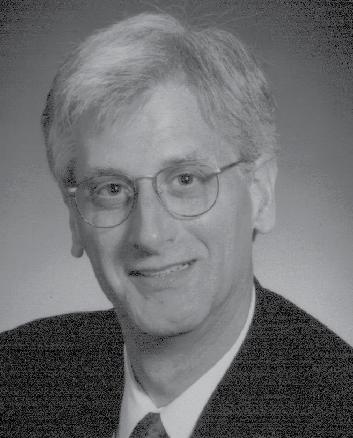
Event Details
Event Details
Event Details
Statehouse Convention Center in the Wally Allen Ballroom
Statehouse Convention Center in the Wally Allen Ballroom
Statehouse Convention Center in the Wally Allen Ballroom
101 East Markham Street, Little Rock, AR 72201
101 East Markham Street, Little Rock, AR 72201
101 East Markham Street, Little Rock, AR 72201

Thursday, October 20
Thursday, October 20
Thursday, October 20
Cocktail Reception at 6 p.m. | Program at 7 p.m.
Cocktail Reception at 6 p.m. | Dinner & Program at 7 p.m.
Cocktail Reception at 6 p.m. | Program at 7 p.m.
Cocktail/Formal (black tie optional)
Cocktail/Formal (black tie optional)
$200 each or Table of 8 for $1,500
Cocktail/Formal (black tie optional)
$200 each or Table of 8 for $1,500
$200 each or Table of 8 for $1,500
To purchase tickets or a table, visit: arkansaspress.org/events.
To purchase tickets or a table, visit: arkansaspress.org/events.
To purchase tickets or a table, visit: arkansaspress.org/events.
About the Honorees
2020 Headliner of the Year
Asa Hutchinson, Governor of Arkansas
Asa Hutchinson is the 46th governor of the State of Arkansas. In 2018, he was re-elected with 65% of the vote, having received more votes than any other candidate for governor in the state’s history. He has won recognition for the state as a leader in computer science education, cut taxes by over $250 million, and signed a law that exempts the retirement pay of veterans from state income tax.
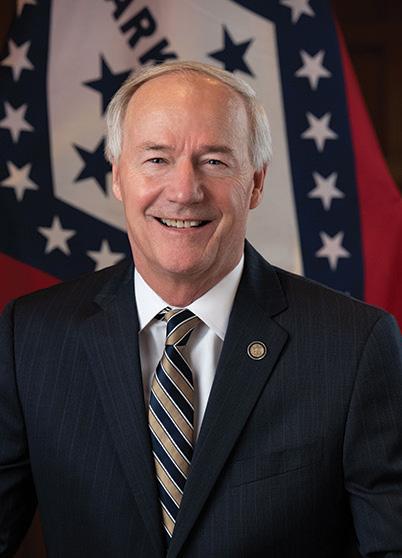
President Ronald Reagan appointed Governor Hutchinson as U.S. Attorney for the Western District of Arkansas. In 1996, he won the first of three successive terms in the U.S. House of Representatives. During his third term in Congress, President George W. Bush appointed him director of the Drug Enforcement Administration and later as an undersecretary in the newly created Department of Homeland Security. His experience has established him as a national resource for his expertise on trade, energy, national security and education. The governor has been invited to the White House several times to join discussions about health care, Medicaid and education issues.
The Governor is the former Chairman of the National Governors Association. He is also the former co-chair of the Council of Governors and the former chairman of the Interstate Oil and Gas Compact Commission (IOGCC), Southern States Energy Board (SSEB) and the Southern Regional Education Board.
Governor Hutchinson grew up on a small farm in Gravette. He is a graduate of the University of Arkansas law school. He and his wife, Susan, have been married 49 years. They have four children and seven grandchildren.
2021 Headliner of the Year
Hunter Yurachek, Vice Chancellor and Director of Athletics University of Arkansas
In his fifth full year as vice chancellor and director of athletics at the University of Arkansas, Hunter Yurachek has solidified the Razorbacks as one of the nation’s elite intercollegiate athletics programs. Since December 2017 Yurachek has worked tirelessly to foster athletics success in 19 sports, restore the tradition of a storied program and enhance the student-athlete experience for 465 student-athletes.
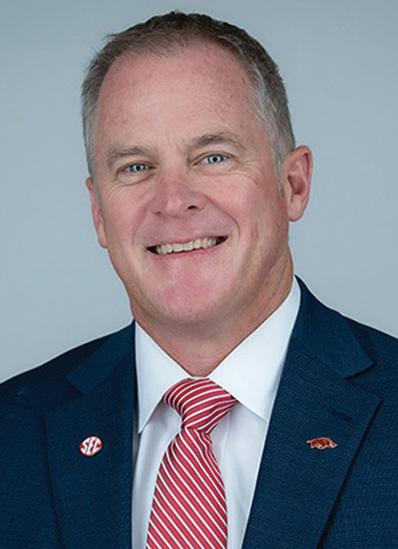
In the 2021-22 academic year, Arkansas recorded the most successful collective year in the program’s history, winning eight Southeastern Conference championships and finishing seventh in the Learfield IMG Directors’ Cup, the competition that tracks the nation’s most successful intercollegiate athletics programs. This bested the eighth place finish Razorback Athletics posted in 2020-21. Arkansas’s previous best finish prior to 2020-21 was 14th in the competition.
The Razorbacks finished first among programs with 19 or fewer sports, second among SEC schools and earned only its second top-10 Directors’ Cup finish, following a then-record eighth place finish in 2020-21. Despite sponsoring only 19 sport programs, Arkansas
earned a total of nine top-10 NCAA finishes and 12 top-20 NCAA finishes.
In the classroom, Razorback student-athletes earned a program-record 3.27 GPA and a total of 97 Razorback student-athletes earned their degrees in the 2021-22 academic year.
The University of Arkansas and Yurachek are being nationally recognized for those accomplishments. Yurachek was selected as a 202122 Football Bowl Subdivision Cushman & Wakefield Athletics Director of the Year by his peers, and was also a finalist for the Sports Business Journal 2022 Athletics Director of the Year.
Arkansas Governor Asa Hutchinson named Yurachek to the Governor’s Economic Recovery Task Force to help guide state reopening in the wake of COVID-19. In April 2021, Yurachek was named to the NCAA Football Oversight Committee, after previously serving on the NCAA Football Competition Committee
Distinguished Service Award
Craig and Brent Renaud, Documentary Filmmakers, Television Producers and Film

Programmers
Renaud Brothers
The Renaud Brothers are best known for their character driven, cinema verité documentaries like Dope Sick Love, Last Chance High, Off to War and Meth Storm. The Renauds also co-founded the Little Rock Film Festival, which was named one of the top film festivals in the country by Filmmaker Magazine.
Brent Renaud was the first American journalist killed in Ukraine in 2022, while documenting the refugee crisis. The Renaud Brothers’ work has won a Peabody Award, two Columbia DuPont Awards, two Overseas Press Club Awards, an IDA award, a Webby and an Edward R. Murrow Award. Craig Renaud is currently in production on a number of film projects, including a documentary about his late brother Brent and a national PBS series called Southern Storytellers.
 Brent Renaud pictured in a Libyan Desert. Photo courtesy of Jeff Newton.
Brent Renaud pictured in a Libyan Desert. Photo courtesy of Jeff Newton.
Golden 50 Service Award
Golden 50 Service Award
John Brummett, Columnist
John Brummett, Columnist
In December 1969, a few days after his 16th birthday, John Brummett , a junior at McClellan High School in Little Rock and sports editor of his school newspaper, went to work part-time for the then-afternoon Arkansas Democrat in the sports department.
In December 1969, a few days after his 16th birthday, John Brummett , a junior at McClellan High School in Little Rock and sports editor of his school newspaper, went to work part-time for the then-afternoon Arkansas Democrat in the sports department.
He worked before school, from 6 a.m. to 8 a.m., helping produce the afternoon sports pages. He covered local high school sports events in the evenings and local golf, tennis and swimming events in summer.
He has worked continuously since—more than 52 years—for newspapers or news services in Arkansas.
He worked before school, from 6 a.m. to 8 a.m., helping produce the afternoon sports pages. He covered local high school sports events in the evenings and local golf, tennis and swimming events in summer.
While attending the University of Central Arkansas, he was sports editor of the Log Cabin Democrat in Conway and later a news reporter for the paper. He joined the Arkansas Gazette in July 1977 as a statedesk general assignment reporter. He became a state Capitol reporter for the paper in 1980, and, as the newspaper war between the Gazette and Democrat heated up, a columnist beginning in 1986.
He became a senior editor of the Arkansas Times and Arkansas Business in 1990 while also a contract columnist for the Democrat. Then, in 1993, he wrote columns both for the Democrat and Times while in Washington writing a book, called “Highwire,” about Bill Clinton’s first year as president.
He has worked continuously since—more than 52 years—for newspapers or news services in Arkansas. While attending the University of Central Arkansas, he was sports editor of the Log Cabin Democrat in Conway and later a news reporter for the paper. He joined the Arkansas Gazette in July 1977 as a statedesk general assignment reporter. He became a state Capitol reporter for the paper in 1980, and, as the newspaper war between the Gazette and Democrat heated up, a columnist beginning in 1986.
He became a senior editor of the Arkansas Times and Arkansas Business in 1990 while also a contract columnist for the Democrat. Then, in 1993, he wrote columns both for the Democrat and Times while in Washington writing a book, called “Highwire,” about Bill Clinton’s first year as president.
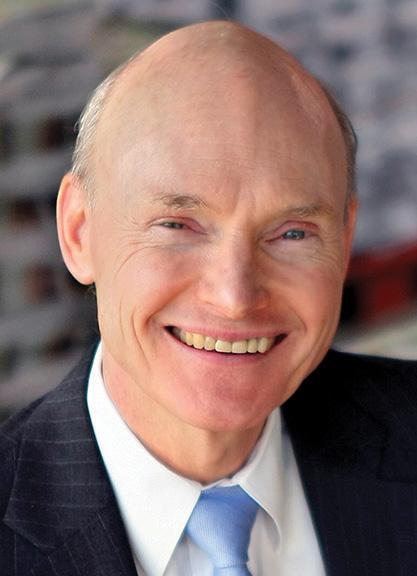
Back in Little Rock in 1994, he became exclusively a columnist for the surviving Arkansas-Democrat-Gazette, leaving in 2000 to become a columnist for the Arkansas New Bureau of Stephens Media. He returned in 2011 to the Democrat-Gazette as a contract columnist, and he continues in that role today.
Back in Little Rock in 1994, he became exclusively a columnist for the surviving Arkansas-Democrat-Gazette, leaving in 2000 to become a columnist for the Arkansas New Bureau of Stephens Media. He returned in 2011 to the Democrat-Gazette as a contract columnist, and he continues in that role today.
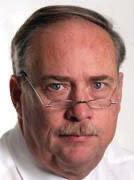
He has won many state column-writing awards, a few regional ones and two national ones from the association of state Capitol reporters.
In 2017, he was inducted into the Arkansas Writers Hall of Fame.
He has won many state column-writing awards, a few regional ones and two national ones from the association of state Capitol reporters.
In 2017, he was inducted into the Arkansas Writers Hall of Fame.
Walter E. Hussman, Jr., Chairman of WEHCO Media, Inc. Arkansas Democrat-Gazette
Walter E. Hussman, Jr., Chairman of WEHCO Media, Inc. Arkansas Democrat-Gazette
Walter E. Hussman, Jr., a third-generation newspaperman, was born January 5, 1947, in Texarkana and grew up in Camden. His father was publisher of the Camden News, and his grandfather was publisher of the Texarkana Gazette. Hussman earned his Bachelor of Arts degree in journalism from the University of North Carolina and an M.B.A. from Columbia University in New York. He began his carerer as a reporter for Forbes magazine but returned to Arkansas in September, 1970 to work in the family business, and became general manager of the Camden News in 1971.
Walter E. Hussman, Jr., a third-generation newspaperman, was born January 5, 1947, in Texarkana and grew up in Camden. His father was publisher of the Camden News, and his grandfather was publisher of the Texarkana Gazette. Hussman earned his Bachelor of Arts degree in journalism from the University of North Carolina and an M.B.A. from Columbia University in New York. He began his carerer as a reporter for Forbes magazine but returned to Arkansas in September, 1970 to work in the family business, and became general manager of the Camden News in 1971.
In a David-versus-Goliath battle that few predicted he would survive, Hussman went head-to-head with the established, dominant Arkansas Gazette and won. Earlier in 1974, Hussman persuaded his father to buy the Arkansas Democrat, the afternoon daily newspaper in Little Rock. After a protracted and heated newspaper war, legal battles and even with the sale of the Arkansas Gazette to Gannett in 1986, Hussman emerged the winner and bought the assets of the rival newspaper in 1991, creating the Arkansas Democrat-Gazette
In a David-versus-Goliath battle that few predicted he would survive, Hussman went head-to-head with the established, dominant Arkansas Gazette and won. Earlier in 1974, Hussman persuaded his father to buy the Arkansas Democrat, the afternoon daily newspaper in Little Rock. After a protracted and heated newspaper war, legal battles and even with the sale of the Arkansas Gazette to Gannett in 1986, Hussman emerged the winner and bought the assets of the rival newspaper in 1991, creating the Arkansas Democrat-Gazette.
Today, WEHCO Media operates 10 daily newspapers, eight weekly newspapers and nine cable television companies in six states. Hussman was named Publisher of the Year by Editor & Publisher magazine in 2009. He was a member of the board of directors of The Associated Press from 2000 to 2009 and C-SPAN from 1995 to 2003. Hussman championed education and after-school programs in Little Rock and the state of Arkansas. He also served on the Arkansas Arts Center board of directors, on the board of the Arkansas Repertory Theater and on the Arkansas Symphony Orchestra Society board of directors. While on the symphony board, he started Pops on the River, a patriotic symphony and fireworks show on the Arkansas River in Little Rock each 4th of July. In 2017, the UNC Hussman School of Journalism and Media was named in recognition of four generations of the family committed to journalism.
Today, WEHCO Media operates 10 daily newspapers, eight weekly newspapers and nine cable television companies in six states. Hussman was named Publisher of the Year by Editor & Publisher magazine in 2009. He was a member of the board of directors of The Associated Press from 2000 to 2009 and C-SPAN from 1995 to 2003. Hussman championed education and after-school programs in Little Rock and the state of Arkansas. He also served on the Arkansas Arts Center board of directors, on the board of the Arkansas Repertory Theater and on the Arkansas Symphony Orchestra Society board of directors. While on the symphony board, he started Pops on the River, a patriotic symphony and fireworks show on the Arkansas River in Little Rock each 4th of July. In 2017, the UNC Hussman School of Journalism and Media was named in recognition of four generations of the family committed to journalism.
2022 Partner Levels
HEADLINER
(SOLD)
• One complimentary table for eight at event
• Branding in statewide newspaper advertisement promoting event
• Five complimentary full-page advertisements in association newsletter
• Three complimentary statewide news release distributions to the APA News Network
• Name/logo on event tickets
• Name/logo on event tables, signage and promotional materials
FRONT PAGE SPONSORS
$7,500
• One complimentary table for eight at event
• Branding in statewide newspaper advertisement promoting event
• Three complimentary full-page advertisements in association newsletter
• Two complimentary statewide news release distributions to the APA News Network
• Name/logo on event signage and promotional materials
BREAKING NEWS SPONSORS
$5,000
• Four complimentary tickets to event
• Branding in statewide newspaper advertisement promoting event
• One complimentary full-page advertisement in association newsletter
• Name/logo on event signage and promotional materials
FRIENDS OF PRESS FREEDOM – INDIVIDUAL SPONSORS ONLY
$500
Show your support for freedom of speech and freedom of the press in honor or in memory of a loved one, or in your own name. Email information to ashley@arkansaspress.org
• One complimentary ticket
• Name submitted printed in event program
All donations benefit the Arkansas Newspaper Foundation, a 501(c)(3) nonprofit organization, and are tax-deductable.
